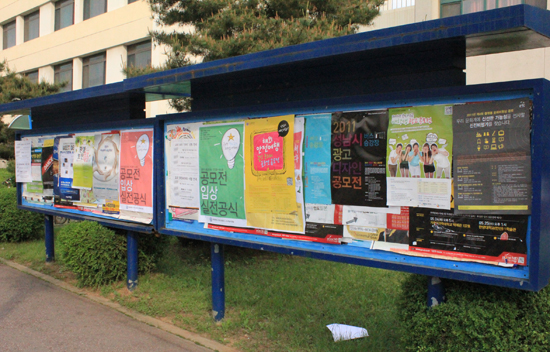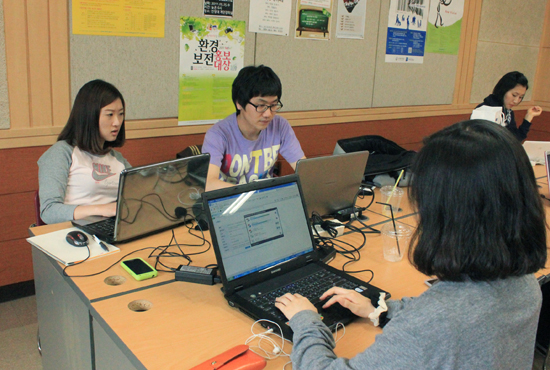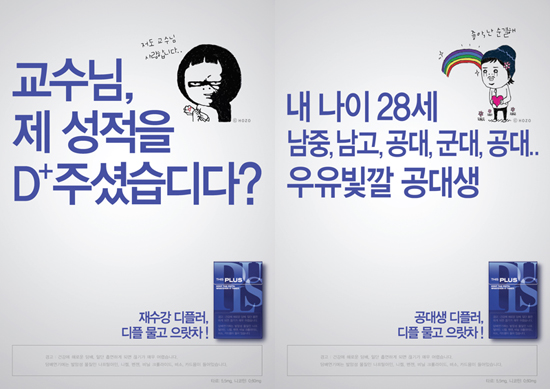
Most students might think the things they imagined in high school will come to be realized upon entering college. However, it is difficult to find those who are enjoying campus life or dedicated to participating in club activities. Instead, the number of students not satisfied with their life on campus, but trying to get involved in off-campus activities is growing. These people are so called out-campus students. They are not only interested in enterprise and its culture, but also eager to get to know a variety of people.
The reason why they are not satisfied with their campus life is because of the unemployment crisis. They are so immersed in stock piling ammunition for their resumes, they can hardly think outside of that arena. The situation is worsened because there are so few areas they can competitively venture in. Therefore, a breakthrough that students have found to overcome the unemployment problem is to get adequate hands-on experiences. As part of such an effort, today's students take on the challenge of project competitions which are hosted by companies or public organizations to provide an arena for students and the general public to compete with their ideas.
The Origin and Types of Project Competitions
1000 project competitions are held annually according Thinkgood, a well-known website for project competitions. It has been a relatively short time that the wider public has come to respond actively to its competitions. The history of Korea's project competitions dates back to 1925 of the annual spring literary contest. Since then, various types of project competitions have emerged.
While in the past, these competitions were limited to the areas of advertising, design, and academic papers, these days there are a variety of types of project competitions including planning, ideas, and overseas expedition programs. Participation project competitions are especially gaining popularity among students in recent years since they do not require students to have any special knowledge regarding their majors. These project competitions encourage university students to participate in creating contents and carrying out marketing promotion. In this category, there are activities like company marketing, overseas expeditions, prosuming(a combination of producing and consuming), and student reporting.
In addition to the project competition fever, there exist as many as 13 web sites devoted to providing information related to project competitions including Thinkgood and Detizen.
Advantages of Project Competitions for the Hosts and Students
Students attain merits like cash prizes, internship opportunities, and career building prospects when they win project competitions. "Advertising is a practical study. That is why it is very important to apply knowledge learned from theory into practical business. I participated in project competitions as a means of career research by experiencing tasks in the advertising field in advance," said Park Se-young, a Sophomore majoring in Advertising.
There are a good number of students who use project competitions as opportunities to find their career path. Some of them have confidence in their majors, while some of them come to realize that their majors do not suit them. As a result, there are remarkably few in trading jobs now that project competitions provide chances to explore the pros and cons of different areas of work.
University students for the most part are not rich enough to afford everything they want. Moreover, they want to travel abroad. Oh Seung-jin, a Sophomore in the Division of Economics said, "Project competitions are attractive to students since they can win cash prizes and learn something at the same time. It is like killing two birds with one stone." However, there is another reason behind all of these merits of project competitions. "I hope students learn more from their efforts and the process of understanding what the consumers want through learning insight of the products. I also hope they can seize the opportunity to fully express their ideas and arguments," said Lee Hyo-bok, a professor in the Division of Advertising and Public Relations.
The strongest reason why undergraduates participate in project competitions is to build what Koreans call "spec" or their resumes, which determine students' career prospects when they prepare for the job market. A survey conducted by The Hanyang Journal showed that 37 percent of 300 of students at the Seoul and ERICA campus consider records of award as the best benefits of project competitions. These days, the employment market highly regards win records when it comes to resumes. Project competitions are not only helpful in job applications, but also after entering the company.
Park Shin-young works at Cheil Worldwide as an account executive. She is called the "Queen of project competitions" by university students for winning a total of 23 project competitions. This record is unprecedented. With her experience, she was hired by Cheil Worldwide, an advertising company, through a special employment program.
Park says, "When I prepared for the project competitions, I wrote planning documents dozens of times. This procedure helps me progress my work more quickly on the work-site. Actually, there is no way to come up with good ideas. However, the process of discussions for good idea is not significantly different from project competitions. Presentations especially help a lot through the skills obtained from project competitions." According to the survey, 68 percent of Hanyangians answered their first experiences in participating in project competitions were during their Freshman and Sophomore years. This is a period that is far from job-hunting agendas. Such a thing proves how serious the problem of unemployment is among young people and how much students feel the pressure. Therefore, students use project competitions as a best means of self-advertisement in the midst of the unemployment crisis.
Are students the only ones who feel need for these project competitions? The parties regarding project competitions are students, companies, the government, and so on. In the public institutions, the purpose in carrying out project competitions is to communicate the nation? policies with the public. Furthermore, it encourages the public to participate in these policies.
In the private sector, companies buy creative ideas from the university students for a small sum of money or internship programs. This is also a good chance to promote their companies. "Project competitions help us to promote our company to potential customers as well as find competent individuals who will take responsibility of the future of the company," said Nam Jong-suk, Corporate Communications Team Pro of Cheil Worldwide. In this sense, project competitions are a win-win knowledge information program that promotes economic vitalization, employment, and education and industry interaction.

The Dark Side of Project Competitions
The original purpose of project competitions has been distorted because of the sudden weed-like sprouting. The number of so-called contest hunters, who recklessly chase after cash prizes, has recently shown an increase. Companies focus solely on promoting themselves to reduce the cost of advertising as well as buying creative ideas of students at a low price.
Among students, there are those who outsource their work to professional businesses in order to win project competitions. This is because application record of wins in project competitions are almost considered mandatory for resumes when it comes time for job-hunting. It seems students are above plagiarism when it comes to winning.
To prevent the controversy of plagiarism, Cheil Worldwide decided to disclose the finalist projects for about ten days on their blog after the second evaluation. If there is any plagiarism, a panel of examiners determines whether or not any work was plagiarized in the final screening. If plagiarism is found after the award is determined, the selection is canceled.
Copyright infringement results in someone? intellectual property being abused and that kind of infringement is disciplined through penalties of civil compensation along with criminal liability. However, these days, we are unlimitedly exposed to ideas and information so it is easy to just copy existing ideas unconsciously. Before submitting project competition entries, people must check with the Korea Institute of Patent Information or websites of project competitions with authority in the field to make sure that their entries do not plagiarize previous works that have won prizes.
Some students are deteriorated to shells because of project competitions sometimes not even paying attention to their grades. Preparing for project competitions during the semester while studying may be a big burden because it demands a lot of time and expense. "I found it difficult to manage and distribute time between studying and preparing for project competitions. I often missed classes and dozed off during class," said Lee Dong-min, a Sophomore majoring in Multimedia and Interactive design. "It is not usually desirable for students to miss classes. Project competitions require students to have logic as well as creative ideas. This logic is obtained through theory and academic knowledge. Thus, I recommend students to stay focused in every class they attend," said Professor Lee.
In addition, choosing what competitions students are going to prepare for is the key to carrying out both study and the project well together. It is also an effective way to link school projects and competitions to efficiently manage time. For example, there may be poster designs for school projects in departments related to art or design and business administration departments have a variety of projects that analyze marketing strategies. That is why it is most effective to choose a project competition that is highly related to classes or exams.
To avoid indiscriminately participating in project competitions, students must check that how long the history of the project competition has lasted and how extensive the scale of the host competition is. Also, it is necessary to make certain that those holding project competitions implement fair and transparent judging systems. "How many times applicants won in project competitions is not too important. We focus on three other main factors: whether the contest is related to the field of application, how prestigious the contest is, and what they won are reviewed," said a human resources director at LG who wishes to remain unnamed.
According to JobKorea, a website devoted to employment, their analysis on job posting registered on the site showed that winners of project competitions are given preferential treatment with the highest rate 28.5 percent of the evaluated factors. This figure is higher than the percentage accosted to English or other language achievements. Usually the first winner is hired through special employment programs. However, in each project competition, the number of first prize winners is limited. Of course, the truth remains that the prizes contribute towards employment but the extent of its significance should be determined. Even if job applicants have records of project competition wins, there are some cases where students drop out of the employment market because they were not able to meet the standards of the recruitment exam held by the company. In fact, there are many more competition dropouts than winners in project competitions. This is to say that project competitions do not guarantee employment. Students had better spend time thinking over what is the best choice for them in regard all of these things.

Copyright
Nearly 99 percent of project copyrights belong to the companies holding the project competitions in Korea. This provision is presented at the outline of project competitions by the companies. In the survey, over the half the students at HYU were against companies possessing the copyrights to students' work. "The original work belongs to the students. Thus, it is natural for the rights to go to them. In my opinion, these unilateral practices have to be abolished. If companies have ownership of copyrights, they should rightly pay the students," said Oh Woo-kyung, a Junior in the Department of English and Culture. Even though companies pay the students, a scarcity of expenditures for the work is a serious problem compared to the value of idea and efforts put in by the students.
Copyright can be briefly defined as the rights by law endowed on a person regarding his or her works such as novels or songs being used in publishing or broadcasting. To placate incensed students who are the providers of ideas while at the same time benefiting companies, the copyright authorities have suggested a joint copyright system. "Since the hosting companies have not contributed to the projects in question, the hosting companies cannot have a joint copyright agreement with students. However, if the project student agrees to yield certain rights to the hosting companies, then they can be joint copyright holders. In this case, the distribution of royalties between the students and hosting companies can be specified in a prior contract. Although infrequent, the hosting companies sometimes agree to a mutual ownership of the winning project and its business production," said Yun Sun-hee, a professor at Hanyang Law School.
Since most of the rights to winning projects go to the hosting companies, it would be smart to consult with a patent attorney's office beforehand. When submitting a project for a competition, strengths and effects are also important, but if the idea has value as a patent the monetary benefits may surpass any amount of prize money the host companies may offer. Furthermore, even if is not for the patent rights that last 20 years, there are ways to protect design rights, copyrights, and other intellectual rights," said Ok Yun-sun, a columnist in the field of copyright for project competitions.
Companies must respect students and their projects not from a higher position, but in an equal relationship. Students would work harder putting their name on the line and ultimately produce better quality projects that would also be beneficial to companies. Recently, the Korea Story Project Competition granted intellectual rights to the creators, introducing reform to the practice of companies that reversed rights. It believes that the value of intellectual property rights should be accepted nationally and internationally and the parties holding project competitions should bestow the rights to the creators or at least share them.
Wisdom to Distinguish Gems
The project competitions springing up on campuses seem extravagant on the outside with its prize money, internship programs, and overseas trips. Some even call them a juggernaut of job-hunting. There still are, however, problems to this sudden sensation. In an employment unfriendly environment, the companies have the higher ground and the students are left without their copyrights, without even knowing how fair and transparent the evaluation process is.
It is not even a guarantee for employment, the greatest reason students participate in these competitions in the first place. Of course, project competitions can be a worthwhile experience for college life and it is good to know that their small ideas contributed to economic circulation and social change. However, it is irrational to plough ahead with project competitions because of a sense of falling behind in competitiveness and other shaky, less bright agendas. These days call for our wisdom in knowing the rights and wrongs of project competitions.

